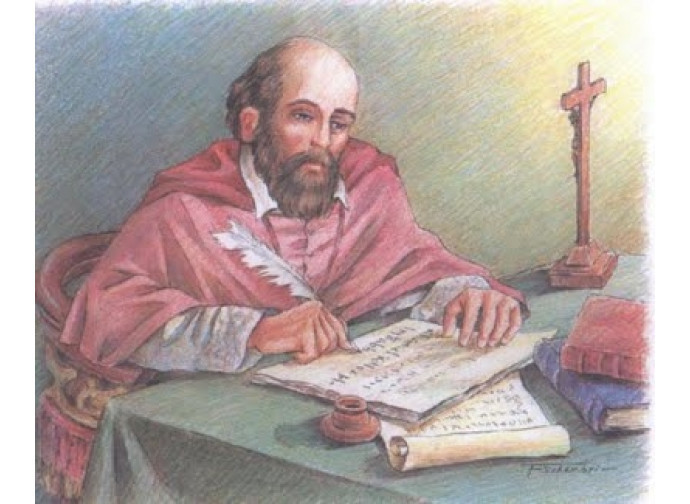Saint Francis de Sales
An inspired writer, preacher, spiritual guide for several saints, Saint Francis de Sales (1567-1622) combined gentleness with an enthusiasm for truth, as Pius XI recalled in the encyclical Rerum Omnium Perturbationem of 1923, for the benefit of "those Catholics who as journalists and writers expound, spread, and defend the doctrines of the Church."

"The friendly Christ of Geneva", people called him for the charity embodied in his actions. An inspired writer, preacher, spiritual guide for several saints, capable of converting many souls who had embraced Calvinism, Saint Francis de Sales (1567-1622) combined gentleness with an enthusiasm for truth, as Pius XI recalled in the encyclical Rerum Omnium Perturbationem of 1923, for the benefit of "those Catholics who as journalists and writers expound, spread, and defend the doctrines of the Church." Since then, the French Saint has been honoured with the title of Patron of Journalists and Writers: “It is necessary that they, in their writings, imitate and exhibit at all times that strength joined always to moderation and charity, which was the special characteristic of Francis. [...] They should never compromise where the truth is involved, nor, because of fear of possibly offending an opponent, minimise or dissimulate it".
Born to a noble family in Upper Savoy and educated in Paris, Francesco obtained a brilliant degree in law from Padua University. At the age of 19 he became aware of his priestly vocation: this realisation came after a phase of deep existential anguish during which he lost sleep and appetite, until he prostrated himself in church in front of an image of Mary, pronouncing an act of total abandonment to the will of God, followed by the recitation of the Memorare. He himself would then compose a similar prayer expressing faith in the intercession of Our Lady, known as the Prayer of Humility.
The defence of Catholic orthodoxy accompanied his whole consecrated life, which was dedicated to bringing the greatest possible number of people back to communion with the Church, at a time when Christian Europe was experiencing the divisions generated by the Protestant Reformation. It was this momentum that, in 1594, prompted Sales to offer to preach in Thonon, the capital of Chiablais, back then a Calvinist stronghold. His catechesis in that French-Swiss region did not immediately obtain the desired effects, also because the Calvinist Consistory had forbidden people to go and listen to Francis, who preached in the only Catholic church left in the city. It was then that the Saint, who had studied the Calvinist and Lutheran authors, wrote a series of flyers to demonstrate their doctrinal errors in the light of the Bible and the works of Catholic theologians. From time to time he would print a number of sheets, which he distributed by hand, posted on the walls or slipped under the doors of the Protestants' houses, many of whom did return to the Catholic Church.
The idea of the flyers had been suggested to him by a friend; its effectiveness was confirmed by an inner voice he had heard during Mass. These were writings so inspired and effective as to be subsequently collected under the title The Controversies, of which Pius IX, who proclaimed Francis Doctor of the Church in 1877, would say: "A marvellous theological science shines through this work; one sees in it excellent method and irresistible logic, both in refuting heresy and in in demonstrating Catholic truth". Francis's missionary zeal was accompanied by fasts and prayers, and founded on love for the Church and for souls, which clashes with some of today's celebrations of Martin Luther.
Francis' concern for his neighbour and abandonment to God's love emerge in his two most famous and mystical works, the Introduction to the Devout Life (Philothea) and the Treatise on the Love of God, whose teachings influenced the spirituality of such champions of charity as Saint Vincent de Paul, Francis' great friend, and, two centuries later, Saint John Bosco. Francis wrote these two works when he had already become bishop of Geneva and was implementing the reforms of the Council of Trent. This was also the time of his encounter with the widow Jane Frances de Chantal, the Saint who in 1610 assisted him in the foundation of the Order of the Visitation. From this, in the second half of the century – thanks above all to the apparitions to Saint Margaret Mary Alacoque – would spread the devotion to the Sacred Heart of Jesus.
Patron of: Catholic press, journalists, writers, deaf-mutes; Piedmont, Salesians
Further readings: Philothea, The Disputes, Treaty of the love of God, by Saint Francis de Sales
